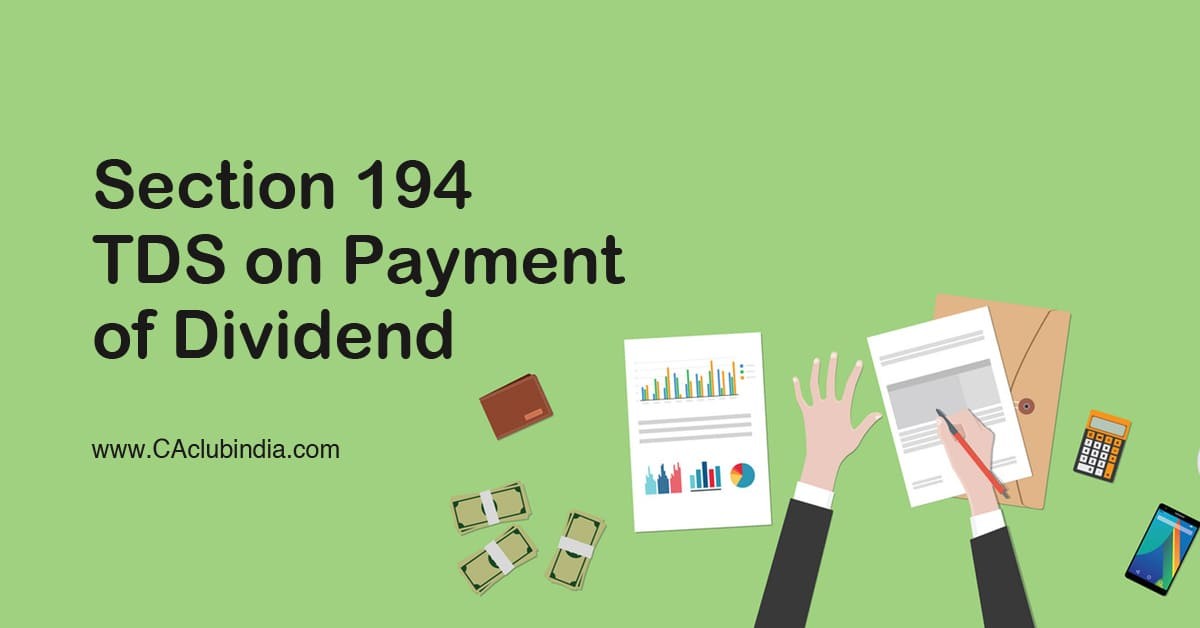192. The principal officer of an Indian company or a company which has made the prescribed arrangements for the declaration and payment of dividends (including dividends on preference shares) within India, shall, before making any payment 33[by any mode] in respect of any dividend or before making any distribution or payment to a shareholder, who is resident in India, of any dividend within the meaning of sub-clause (a) or sub-clause (b) or sub-clause (c) or sub-clause (d) or sub- clause (e) of clause (22) of section 2, deduct from the amount of such dividend, income-tax 34[at the rate of ten per cent]:
Provided that no such deduction shall be made in the case of a shareholder, being an individual, if -
(a) the dividend is paid by the company by 35[any mode other than cash]; and
(b) the amount of such dividend or, as the case may be, the aggregate of the amounts of such dividend distributed or paid or likely to be distributed or paid during the financial year by the company to the shareholder, does not exceed 36[five thousand] rupees:
Provided further that the provisions of this section shall not apply to such income credited or paid to -
(a) the Life Insurance Corporation of India established under the Life Insurance Corporation Act, 1956 (31 of 1956), in respect of any shares owned by it or in which it has full beneficial interest;
(b) the General Insurance Corporation of India (hereafter in this proviso referred to as the Corporation) or to any of the four companies (hereafter in this proviso referred to as such company), formed by virtue of the schemes framed under sub-section (1) of section 16 of the General Insurance Business (Nationalisation) Act, 1972 (57 of 1972), in respect of any shares owned by the Corporation or such company or in which the Corporation or such company has full beneficial interest;
(c) any other insurer in respect of any shares owned by it or in which it has full beneficial interest.
37[***]

1) Who is responsible to deduct tax u/s 194?
The principal officer of an Indian company or a company which has made the prescribed arrangements for the declaration and payment of any dividend (including dividends on preference shares) to a shareholder, who is resident in India, is required to deduct tax at source.
2) What is the threshold limit u/s 194?
No deduction up to Rs. 5000, if the dividend is paid by any mode, other than cash.
3) When to Deduct TDS under Section 194?
Such tax shall be deducted before making payment of dividend.
4) Rate of TDS under Section 194
Tax is to be deducted at the rate of 10% (7.5% w.e.f. 14.05.2020 to 31.03.2021). If the recipient of income doesn‘t furnish his PAN to deductor then TDS is to be deducted at the rate of 20%.
5) Other Points-
- Only Individual Shareholder can furnish Form No. 15G or 15H, as the case may be.
- No deduction on dividend paid to LIC, GIC or any other connected insurer.
Summary
|
Particular |
Rate of TDS |
Remarks |
|
Resident Shareholders |
· 10% (presently reduced to 7.5% until 31st March 2021) if dividend amount exceeds INR 5,000 · 20% in absence of PAN |
· No TDS if Form 15G/15H submitted · No TDS for specified Insurance companies/Mutual Funds and AIF |
|
Non Resident Shareholders (Other than FPI) |
20% plus applicable surcharge and cess or rates as per DTAA whichever is beneficial |
· Surcharge restricted to a maximum of 15% · TRC to be obtained with a declaration for PPT, beneficial ownership, No PE/POEM in India |
|
FPI |
20% plus applicable surcharge and cess |
|
|
Compliance Requirements |
· Filing TDS Return and Issuing TDS Certificates · Form 15CA in case of all payment to Non Residents · CA Certificate in Form 15CB in case payment to Non Residents exceeds INR 5 Lakhs |










 CAclubindia
CAclubindia
